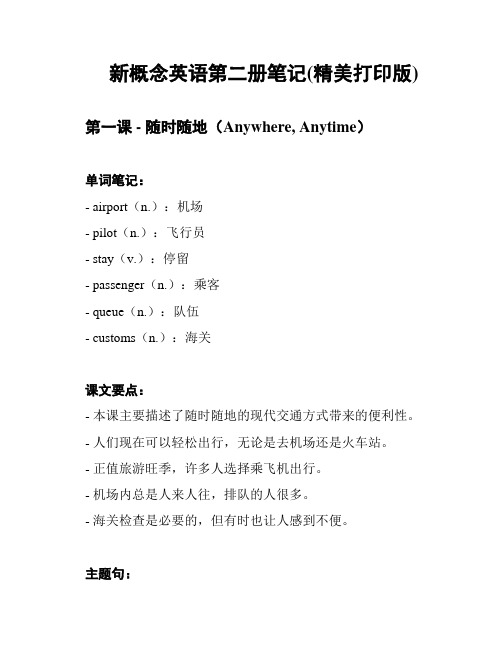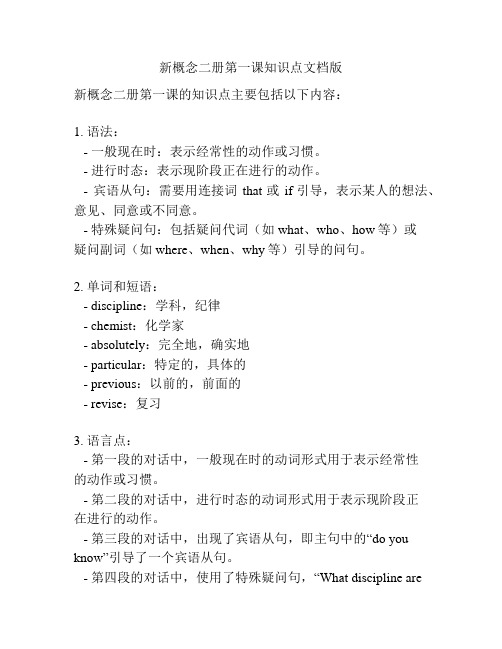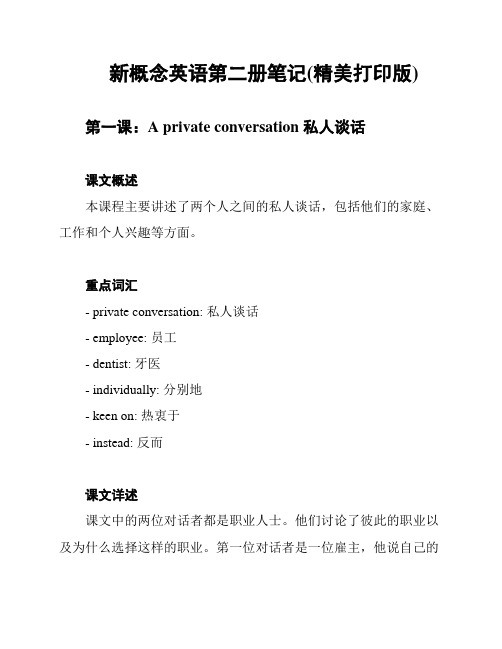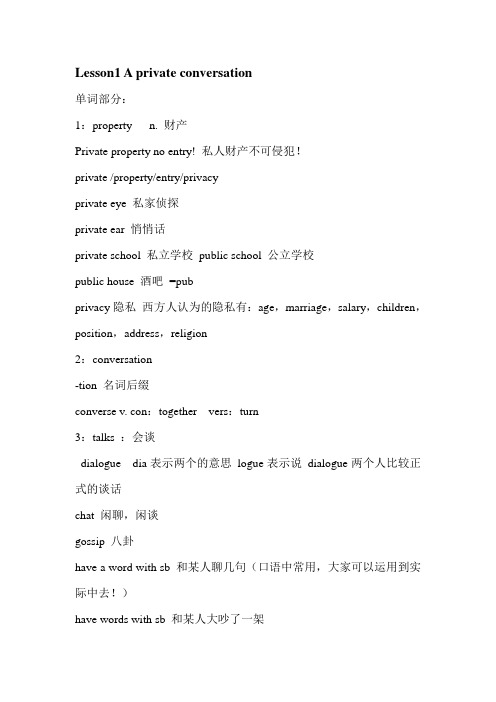新概念第二册第一课笔记
新概念英语第二册笔记(精美打印版)

新概念英语第二册笔记(精美打印版)第一课 - 随时随地(Anywhere, Anytime)单词笔记:- airport(n.):机场- pilot(n.):飞行员- stay(v.):停留- passenger(n.):乘客- queue(n.):队伍- customs(n.):海关课文要点:- 本课主要描述了随时随地的现代交通方式带来的便利性。
- 人们现在可以轻松出行,无论是去机场还是火车站。
- 正值旅游旺季,许多人选择乘飞机出行。
- 机场内总是人来人往,排队的人很多。
- 海关检查是必要的,但有时也让人感到不便。
主题句:现代交通方式的进步使我们能够随时随地旅行。
语法重点:- 本课中出现了一些现在进行时的句子,如:People are going to airports and railway stations.(人们正前往机场和火车站。
)- 该课还涉及到一些定冠词的用法,如:I like the customs officer.(我喜欢海关工作人员。
)- 其他值得注意的语法点包括人称代词的宾格形式、形容词比较级等。
第二课 - 奇怪的事(Something Strange)单词笔记:- strange(adj.):奇怪的- fly(v.):飞- cloud(n.):云- monster(n.):怪物- little(adj.):小的- eat(v.):吃- bird(n.):鸟课文要点:- 本课主要讲述了一个小男孩和他的奇怪经历。
- 有一天,男孩看到了一只怪物,它是一个身穿红色衣服、长着绿色头发和眼睛的生物。
- 怪物告诉男孩,他不会飞,但是他能飞到云中间。
- 然后,怪物吃了一些小鸟。
- 最后,怪物告诉男孩他会在树上等待,然后就飞走了。
主题句:男孩看到了一个奇怪的怪物,并与它进行了交谈。
语法重点:- 这篇课文中包含了一些过去式的动词,如:He ate five small birds.(他吃了五只小鸟。
裕兴新概念英语第二册笔记_第1课_课文解读

TextLast week I went to the theatre.是简单陈述句,把时间状语放置句首了,起强调作用。
go to somewhere 去某地go to school 去上学go to work 去上班go home 回家go to the theatre 去看戏go to the cinema 去看电影I had a very good theatre.这句话相当于:I was sitting in a good place; maybe I was sitting in the front of the theatre.The play was very interesting.interesting adj 令人感兴趣的 主语为物eg The play was interesting.这部戏很有趣。
eg The boy was interesting.这个小男孩很有趣。
(让我觉得有趣)interested adj 感到感兴主语是人eg I was interested in the play.我对这部戏很感兴趣。
eg I am not interested in your affairs. 我对你的事不感兴趣。
I did not enjoy it.enjoy v enjoy your life 享受生命,享受生活(enjoy 后面接名词)enjoy the meal 享受一顿饭enjoy the sunshine 享受阳光enjoy equal rights 享受平等的权利enjoy oneself 玩的开心 (enjoy 后面接代词)=have a good time/have a wonderful time eg I enjoy fishing.我喜欢钓鱼。
(enjoy 后面接动名词)eg I enjoy swimming.我喜欢游泳。
eg I enjoy making friends.我喜欢交朋友。
《新概念英语》第二册课文、笔记

§ Lesson One A private conversation 私人谈话First listen and then answer the question.听录音,然后回答以下问题。
Why did the writer complain to the people behind him?Last week I went to the theatre. I had a very good seat. The play was very interesting. I did not enjoy it. A young man and a young woman were sitting behind me. They were talking loudly. I got very angry. I could not hear the actors. I turned round.I looked at the man and the woman angrily. They did not pay any attention. In the end, I could not bear it. I turned round again. "I can't hear a word!"I said angrily."It's none of your business," the young man said rudely. "This is a private conversation!"【参考译文】上星期我去看戏。
我的座位很好,戏很有意思,但我却无法欣赏。
一青年男子与一青年女子坐在我的身后,大声地说着话。
我非常生气,因为我听不见演员在说什么。
我回过头去怒视着那一男一女,他们却毫不理会。
最后,我忍不住了,又一次回过头去,生气地说:“我一个字也听不见了!”“不关你的事,”那男的毫不客气地说,“这是私人间的谈话!”【New Words and Expressions 生词与短语】★private adj.私人的 public:公众的,公开的private citizen普通公民; private life:私生活it's my private letter/house;private school 私立学校;public school 公立学校;public letter 公开信;public place 公共场所in private: 私下里的;in public: 公开的Why not have a conversation in public?privacy隐私 it's a privacy. n.★conversation n.谈话,比较正式一些subject of conversation:话题★talk可以正式,也可以不正式(私人的)let's have a talk.They are having a conversation.conversation 用的时候比talk正式,意思上往往不非常正式.★dialogue:对话China and Korea are having a dialogue. 正式★chat: 闲聊★gossip:嚼舌头have a + talk/chat/dialogue/conversation/gossip 名词变动词★theatre n.剧场,戏剧;cinema: 电影院★seat n.座位 have a good seat (place)take a seat : 座下来,就座take your seat/take a seatIs the seat taken? 这个座位有人吗?no/yessit:sit down, pleaseseat:take your seat, pleasebe seated, please 更为礼貌seat是及物动词,后面有宾语sit是不及物动词,后面不加宾语sit he is sitting there.seat后面会加人; seat sb.; seat him; seat:让某人就座you seat him.【语法精粹】When all those present (到场者)____ he began his lecture.(重点题)A.sitB.setC.seatedD.were seated √sit, sit down; seat, be seated; take a seat★angry adj. 生气的;angrily adv. 副词修饰动词cross=angry ; I was angry. He was cross.★annoyed: 恼火的; I was annoyed.be blue in the face; I am blue in the face. ★attention n. 注意Attention, please. 请注意pay attention : 注意pay attention to : 对什么注意You must pay attention to that girl.pay a little attention :稍加注意pay much attention :多加注意pay more attention :更多注意pay no attention :不用注意★bear(bore, borne) v. 容忍bear/stand/endure忍受的极限在加大I can't bear/stand you.endure : 忍受,容忍; put up with 忍受I got divorced. I could not put up with him.put up with=bear=stand★bear n.熊 white bear白熊、北极熊bear hug : 热情(热烈)的拥抱give sb.. a bear hug★business n. 事business man :生意人; do business: 做生意go to some place on business:因公出差I went to Tianjin on business.★thing 可以指事情,也可以指东西It's my business 私人事情it's none of your business★rudely adv. 无礼地,粗鲁地;rude adj.【课文讲解】go to the theatre = see a film, go to the cinema go to the +地点表示去某地干嘛go to the dairy 去牛奶店go to the + 人 + 's 表示去这个人开的店go to the butcher's 买肉 go to the doctor's 去看病go to school: 去上学go to church: 去做礼拜go to hospital(医院):去看病go home; I am at home.跟home相连一定表示没有事情可做,回家休息★enjoy, enjoy oneself:玩的开心enjoy+sth. : 喜欢, 从当中得到一种享受I like something very much. /I love something.I enjoy the music.★过去进行时态 : 过去的某个时间正在发生的动作一个故事的背景往往用进行时态描述I+be+v(ing) were sitting :当时正座在The girl was reading a book in the garden. A boy came to her.★got : 变得, 表示一种变化I am/was angry 是一个事实I got angry: 强调变化过程got取代be动词, got是一个半联系动词, 可以直接加形容词说话的时候喜欢用缩略. I'm not, he isn't, they aren't写的时候会说: I am not, he is not, they are not I didn't do sth.., I did not do sth..★hear:听见; hear+人:听见某人的话I could not hear you. Beg your pardon?I couldn't hear you. /I couldn't hear a word. /I couldn't catch your words.I couldn't hear you clearly. /I couldn't catch your words.Beg your pardon? /I couldn't catch your words. ★hear a word, a word 等于一句话hear a word of sb.. (actors)He didn't say a word. May I speak to Jim?/May I have a word with Jim? It's none of your business. /None of your business. /It's my business.★turn round:转头★pay (any) attention表示注意;对什么加以注意pay attention to sth.★This is private conversation!private : 私人的, 不想与别人共享【Key Structures关键句型】陈述句一定是有主语,有动词,有宾语,有句号;简单陈述句一定不能少的是主语、动词主语——>动词——>宾语——>状语1 ---主语一般有名词或代词构成2 ---谓语由动词充当3 ---宾语4 ---副词或介词短语,对方式或状态提问,往往做状语I like her very much5 ---地点状语6 ---时间状语可以放在句首或句末,先地点后时间I like the girl very much in Beijing last year.如果问何时何地,是一个固定搭配 when and where【Multiple choice questions多项选择题】★pay attention: 注意(在思想上)notice: 注意(=see 眼睛看)★sitting behindbehind: 在...后面★in front of :在...前面 (相对静止的概念)★before : 在...前面 (+词、句子、一定和时间相连)★above: 在...上面★ahead of: 在...前面 (+时间、位置)(动态的行为)He arrived before six o'clock.Before he came backHe goes ahead of me.★特殊疑问词对后面的答案提问how(adv.) ——对一个方式、状态提问;对形容词、副词、介词短语提问where ——用介词,地点when ——用介词,时间why ——用because回答★any——用在否定句和疑问句中★some——用在肯定句中★none——没有任何东西、没有任何人None knows./None of us knows.★not any=nonot——否定词,要放在非实义动词后面He didn't pay attentionno——形容词、修饰名词I have no time./I don't have any time.★suffer:遭受,忍受 (精神或肉体上)+痛苦bear: 忍受=standI suffer the headache.He often suffers defeat.§ Lesson two Breakfast or lunch? 早餐还是午餐?First listen and then answer the question.听录音,然后回答以下问题。
新概念二册第一课知识点文档版

新概念二册第一课知识点文档版
新概念二册第一课的知识点主要包括以下内容:
1. 语法:
- 一般现在时:表示经常性的动作或习惯。
- 进行时态:表示现阶段正在进行的动作。
- 宾语从句:需要用连接词that或if引导,表示某人的想法、意见、同意或不同意。
- 特殊疑问句:包括疑问代词(如what、who、how等)或
疑问副词(如where、when、why等)引导的问句。
2. 单词和短语:
- discipline:学科,纪律
- chemist:化学家
- absolutely:完全地,确实地
- particular:特定的,具体的
- previous:以前的,前面的
- revise:复习
3. 语言点:
- 第一段的对话中,一般现在时的动词形式用于表示经常性
的动作或习惯。
- 第二段的对话中,进行时态的动词形式用于表示现阶段正
在进行的动作。
- 第三段的对话中,出现了宾语从句,即主句中的“do you know”引导了一个宾语从句。
- 第四段的对话中,使用了特殊疑问句,“What discipli ne are
you in?”表示对方的学科是什么。
新概念二册第一课主要通过对话形式展示了一般现在时、进行时态、宾语从句和特殊疑问句的用法。
通过学习这些知识点,可以帮助学习者进一步掌握英语语法和提高听说能力。
《新概念英语第二册》第一课笔记

n./pron. vt. n./pron. n./pron.
5. 主语 + 谓语 + 宾语 + 宾语补足语(宾补).
n./pron. vt.
n./pron. adj./to do sth.
e.g: He found this trip very exciting.
系动词:
1 . be 动词(am/is/are; was/were) 2. 感官动词(look, smell, taste, sound, touch, feel) 3. 保持(keep, stay, remain, maintain) 4. 变化(go, get, grow, turn, become)
4
4. enjoy doing sth. 喜欢做某事
9. pay attention to sth. 注意某物
enjoy oneself 玩得开心;过得愉快
10. in the end 最终;最后
= have fun/have a good time
11. bear sb./sth. 容忍某人/某事
5. have a conversation with sb. = talk with sb.
1. 上周我去剧院。_________________________________________. 2. 一青年男子与一青年女子坐在我的身后。
________________________________________________________. 3. 我非常生气。__________________________________________. 4. 我回头。_________________________________. 5. 最后,我忍不住了。 _____________________________________.
新概念英语第二册笔记(精美打印版)

新概念英语第二册笔记(精美打印版)第一课:A private conversation 私人谈话课文概述本课程主要讲述了两个人之间的私人谈话,包括他们的家庭、工作和个人兴趣等方面。
重点词汇- private conversation: 私人谈话- employee: 员工- dentist: 牙医- individually: 分别地- keen on: 热衷于- instead: 反而课文详述课文中的两位对话者都是职业人士。
他们讨论了彼此的职业以及为什么选择这样的职业。
第一位对话者是一位雇主,他说自己的员工做事不利索,需要手把手地指导。
他所雇佣的人中,有一位牙医,这位牙医个人能力很强,但做事不守规矩。
第二位对话者是一位操控电视卫星的技术员,他对自己的工作很满意。
他认为这份工作能提供稳定的收入,而且他对这个技术很感兴趣。
相比之下,他并不喜欢在办公室工作。
他坚信个人的兴趣和爱好应该引导自己的职业选择,而不仅仅是为了赚钱。
在谈论个人爱好时,两位对话者发现他们都对音乐很感兴趣。
然而,他们的爱好有所不同。
第一位对话者表示,他喜欢个别的音乐会,而不是大型音乐会。
第二位对话者则喜欢大型音乐会,认为那种氛围和观众的热情是独一无二的。
课后练1. 为什么第一位对话者对自己的员工感到不满意?2. 第二位对话者为什么喜欢做电视卫星的技术员?3. 两位对话者的音乐兴趣有何不同?参考答案1. 第一位对话者对自己员工感到不满意是因为他们做事情不利索,需要手把手地指导。
2. 第二位对话者喜欢做电视卫星的技术员是因为这份工作能提供稳定的收入,而且他对这个技术很感兴趣。
3. 两位对话者的音乐兴趣不同。
第一位对话者喜欢个别的音乐会,而第二位对话者喜欢大型音乐会。
新概念二册1-5课笔记

Lesson1 A private conversation单词部分:1:property n. 财产Private property no entry! 私人财产不可侵犯!private /property/entry/privacyprivate eye 私家侦探private ear 悄悄话private school 私立学校public school 公立学校public house 酒吧=pubprivacy隐私西方人认为的隐私有:age,marriage,salary,children,position,address,religion2:conversation-tion 名词后缀converse v. con:together vers:turn3:talks :会谈dialogue dia表示两个的意思logue表示说dialogue两个人比较正式的谈话chat 闲聊,闲谈gossip 八卦have a word with sb 和某人聊几句(口语中常用,大家可以运用到实际中去!)have words with sb 和某人大吵了一架4:化妆间dressing room ,card table 牌桌5:sit vi. 坐Sb sit.have/take a seat ,please.请某人坐下来,请上座(口语中常用,口气非常客气)seat vt. seat sb 如seat my little baby让我的小孩坐下来,seat myself我坐下来,I am seated我坐下来Be seated,please!请别人坐下来,很正式地请别人上坐替我占座:save a seat for me6:play v.扮演,玩耍n.游戏,玩耍,比赛play the woman 原意为扮演女性引申为撒娇play the man 显示男子气概play house用来玩耍的小区域(如肯德基麦当劳里面小孩玩耍的地方)7:loudlyloudly:noisy 噪音(让人感到厌恶)loud :大声(仅仅表示声音大一点)如:Can you speak louder ? aloud:从原来不发声到发声如:read aloud大声朗读think aloud 自言自语Read aloud together 一起朗读8:angrilyangry adj. angrily adv.be angry at sb.对某人感到生气be cross at sb.(俚语)对某人感到生气be pissed off 生气(口语中用的最多的生气的表达)如:I am so pissedoff.我非常的生气。
新概念-2-Lesson1-笔记

Ⅰ. 重点单词与短语1. theatre n. 电影院,戏院. I worked at the Grand Theatre.play n. 比赛;游戏;戏剧;赌博. It's my favorite Shakespeare play.2. seat(1) n. 座位, 坐处have a seat/ have a good seat 有座位;坐了个好位置take a seat/ take your seat 坐下. Please take a seat. 请坐。
She sat back in her seat.a window/corner seat(2) vt. 向…提供座位,就坐,坐,落座; 可坐…人;能容纳…人&seat sb让某人就坐. He seated himself behind the desk. / You seat him.Please be seated. 请就坐。
(sit down, please. / Please take a seat)The aircraft seats 200 passengers.区分:sit (vi)--- seat(vt) May I sit here / He went and sat behind her.3. enjoy v. 享有,享受;欣赏;喜欢; 使过得快活I enjoy it very much. (enjoy+n)I enjoyed myself at the party. (enjoy+oneself)I enjoy reading very much. (enjoy+doing)4. loudly [ˈlaʊdlɪ] adv. 高声地;吵闹地rudely [ˈru:dlɪ] adv. 粗鲁地;不礼貌地(5. angry [ˈæŋɡri] adj. 生气的;愤怒的, 发怒的be/ get/ grew/feel angry; make sb angry…angry with/at sb at/ about sth . Please don’t be angry with me. It was not my fault.He felt angry at the injustice of the situation. angrily [ˈæŋgrɪlɪ] adv. 愤怒地,生气地近义词:cross (脾气坏的,易怒的,生气的)6. bear [bɛə](1) v. 承受, 容忍, 忍受Can the ice bear my weightHe couldn’t bear the pain. (bear+n.)》She can’t bear being laughed at. (bear+doing)She can’t bear to be laughed at. (bear+to do)bear with sb/sth 耐心对待,容忍. If you will bear with me a little longer, I’ll answer your question.近义词:stand/ endure/ put up withI can’t stand his brother. (暗含不喜欢)She couldn’t endure the thought of parting. (程度深)I don’t know how she puts up with him. (accept sb/sth even…)(2) n. 熊a black bear / bear hug 热情(热烈)的拥抱;give sb a bear hug#7. attention n. 注意,注意力Attention, please.pay attention/pay attention to…. Please pay attention to what I am saying.Don’t pay any attention to what they say.pay a little/much/more/no/close attention8. business n. 商业,交易;生意;个人的事;私事business man 生意人do business做生意go to some place on business因公出差My private life is none of your business. (one’s business 指某人所关心的或份内的事)—It’s my business.9. private adj. 私有的,私人的;秘密的;内心的;平民的,无官职的,士兵的It's my private letter.It's my private house.private life 私生活private school私立学校(公立学校是public school)private citizen 普通公民private soldier 大兵《Private Ryan》《拯救大兵瑞恩》privacy n. 隐私,秘密;私事. It’s my privacy.10. conversation n. 交谈,会话(非正式的会话、谈话,一般用于正式文体)、a telephone conversationhave a conversation (with sb) (about sth). My teacher had a conversation with me about my English study.to get into a conversation with sb 开始与某人攀谈have a talk/chat/dialogue/conversation/gossipⅡ. 语法1.句子的种类(1)陈述句、疑问句、祈使句、感叹句(按使用目的分类)1)陈述句:说明一个事实或陈述一种看法。
- 1、下载文档前请自行甄别文档内容的完整性,平台不提供额外的编辑、内容补充、找答案等附加服务。
- 2、"仅部分预览"的文档,不可在线预览部分如存在完整性等问题,可反馈申请退款(可完整预览的文档不适用该条件!)。
- 3、如文档侵犯您的权益,请联系客服反馈,我们会尽快为您处理(人工客服工作时间:9:00-18:30)。
[生词短语]private adj. 私人的conversation n. 谈话theatre n. 剧场,戏院seat n. 座位play n. 戏loudly adv. 大声地angry adj. 生气的angrily adv. 生气地attention n. 注意bear v. 容忍business n. 事rudely adv. 无礼地,粗鲁地★private adj.私人的① adj. 私人的private life 私生活private school 私立学校It's my private letter. (如果妈妈想看你的信)It's my private house. (如果陌生人想进你的房子)② adj. 普通的private citizen 普通公民I’m a private citizen. (citizen n. 公民)private soldier 大兵《Private Ryan》(《拯救大兵瑞恩》)public adj. 公众的,公开的(private的反义词)public school 公立学校public letter 公开信public place 公共场所privacy[ˈprɪvəsi] n.隐私It’s privacy. 这是我的隐私!(不愿让别人知道的)★conversation n.谈话have a + talk/chat/dialogue/conversation/gossip 名词变动词conversation 一般用于正式文体中, 内容上往往不正式subject of conversation话题They are having a conversation.talk内容可正式可不正式, 也可以私人Let’s have a talk.dialogue对话, 可以指正式国家与国家会谈China and Korea are having a dialogue.chat闲聊,说的是无关紧要的事。
gossip[ˈgɒsɪp]嚼舌头, 说长道短report报道★theatre n.剧场, 戏剧cinema n.电影院★seat n.座位have a good seat/place,这里的seat指place(指地点),而不是chair.take a seat/take your seat 坐下来, 就坐Is the seat taken? 这个位置有人吗?请坐的3种说法 :Sit down, please. (命令性)Take your seat, please.Be seated, please. (更礼貌)作为动词的seat与sit的区别sit(sat,sitten) vi. 就座He is sitting there. 他坐在那儿。
seat vt.让某人就座seat sb. 让某人就坐,后面会加人Seat yourself.You seat him.你给他找个位置.sit down坐下;be seated=take a seat就坐★angry adj. 生气的angry =crossI was angry. /He was cross.annoyed: 恼火的;be blue in the face 脸上突然变色程 I was annoyed.度 I was angry/cross.加 I was very angry.深 I am blue in the face. (脸色都青了, 相当生气了)★angrily adv. 生气的★attention n. 注意Attention ,please. 请注意(口语)pay attention 注意pay attention to …对……注意You must pay attention to that girl.pay a little attention 稍加注意pay much attention 多加注意pay more attention 更多注意pay no attention 不用注意pay close attention 特别注意★bear(bore, born) v. 容忍① vt. 承受,支撑,承担,负担Can the ice bear my weight?Who will bear the cost? 谁来承担这笔费用?② vt. 忍受(一般与can/could连用于疑问句及否定句中)She eats too fast. I can’t bear to watch/watching her.她吃得太快。
我看着受不了。
How can you bear living in this place? 你怎么能受得了住在这个地方?bear =stand =put up withI can't bear/stand you.endure:忍受,容忍put up with :忍受I got divorced(离婚).I could not put up with himbear/stand/endure 忍受的极限在加大bear n.熊 white bear 白熊bear hug :热情(热烈)的拥抱give sb. a bear hug★business n. 事, 生意① n. 生意business man :生意人do business: 做生意go to some place on business:因公出差I went to Tianjin on business.② n. 某人自己的私人的事情It's my business. (指私人的事, 自己处理的事)It's none of your business. 不关你的事。
★rudely adv. 无礼地, 粗鲁地rude adj. 粗鲁的,无礼的★pay vt. &vi. 支付① vt. &vi. 支付(价款等)Have you paid the taxi-driver?You can pay a deposit of thirty pounds…您可以先付30英镑的定金……I’ll pay by instalments.I paid 50 dollars for this skirt. (pay…for sth. 花/支付……(钱)买……)② vt. &vi. 给予(注意等);去(访问)pay attention注意They did not pay any attention.We paid a visit to our teacher last Sunday. 上星期天我们去拜访了老师。
③ n. 工资,报酬I have not received my pay yet. 我还没有领到工资。
【课文讲解】1、Last week,I went to the theatre.动词 go 的原义是离开一个地方去另一个地方,与介词 to 连用后,常加上主语所要去的目的来代表主语的动作目的。
go to the +地点表示去某地干什么go to the theatre = go to the theatre to see a play去剧场看戏go to the cinema =see a film 去电影院看电影go to the dairy 去牛奶店go to the + 人 + 's 表示去这个人开的店go to the doctor's 去看病;go to the butcher's 买肉以下短语中名词前不加冠词(a,an,the):go to school 去上学;go to church 去做礼拜;go to hospital(医院) 去看病;go to bed 上床睡觉;go home回家(跟home相连一定表示没有事情可做,回家休息)I am at home. 在家休息2、I had a very good seat.seat一般指戏院、汽车等配置的固定座位,也可以抽象地表示“座位”或“位子”等概念。
the front seat of a car 汽车的前座Take a seat, please. 请坐。
3、I did not enjoy it.enjoy vt. 欣赏,享受,喜爱① enjoy +n. 喜欢,从当中得到一种享受(后面不能跟人)I enjoy the music.enjoy the dinner/film/program/game② enjoy oneself/代词玩的开心We always enjoy ourselves.③ enjoy +动名词Jane doesn’t enjoy swimming. She enjoys going to the theatre.4、I got very angry.get 在这里有“逐渐变得”的含义,接近 become,是个表示过程的动词,表示状态的变化。
而I was very angry则仅表示当时的状态是生气,并不暗示过程。
I am/was angry. 是一个事实I got angry. 强调变化过程It is hot.It got hot.got 取代be动词,got是一个半联系动词,可以直接加形容词。
5、I could not hear the actors. I turned round.hear sb. 听见某人的话I could not hear you. Beg your pardon?I couldn't hear you./I couldn't hear a word./I couldn't catch your words.I couldn't hear you clearly./I couldn't catch your words.Beg your pardon? /I couldn't catch your words.turn round =turn around 转身6、I looked at the man and the woman angrily.by eyes contect 眼神交流7、In the end, I could not bear it.in the end 最后,终于,表示一段较长的时间之后或某种努力之后in the end =at last=finallyShe tried hard to finish her homework by herself. In the end, she had to ask her brother for help.I could not bear it/you/the noise.8、I can't hear a word!hear a word of sb. (a word 等于一句话)He didn't say a word.May I speak to Jim?/May I have a word with Jim?9、It's none of your business.one’s business 指某人(所关心的或份内)的事It's none of your business./None of your business./It's my business. 不关你的事。
